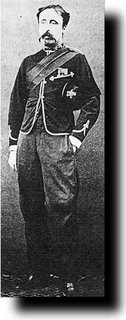Alexander Roberts Dunn was the first Canadian recipient of the Victoria Cross.
Alexander Roberts Dunn
From Wikipedia, the free encyclopedia
Alexander Roberts Dunn
15 September 1833 – 25 January 1868
Charge of the Light Brigade
by Richard Caton Woodville (1825-1855)
Place of birth York, Ontario, Canada
Place of death Senafe, Abyssinia
Resting place Senafe, Eritrea
Allegiance United Kingdom
Service/branch British Army
Rank Colonel
Unit 11th Hussars
100th Regiment of Foot
33rd Regiment of Foot
Battles/wars Crimean War
1868 Expedition to Abyssinia
Awards Victoria Cross
Alexander Roberts Dunn VC (15 September 1833 – 25 January 1868) was the first Canadian awarded the Victoria Cross, the highest and most prestigious award for gallantry in the face of the enemy that can be awarded to British and Commonwealth forces.
He was born in York (later Toronto) in 1833, the son of John Henry Dunn, and studied at Upper Canada College and at Harrow School, England.
Dunn was awarded the Victoria Cross for his actions at the Charge of the Light Brigade during the Battle of Balaclava on 25 October 1854 when he was 21 years of age and serving in the British Army's 11th Hussars. Dunn rescued a sergeant by cutting down two or three Russian lancers who had attacked from the rear. Later in the battle he killed another Russian who had been attacking a private.
He sold his commission at the end of the Crimean War but rejoined the Army in 1858 as a major in the 100th Regiment of Foot. He exchanged into the 33rd Regiment of Foot, in 1864 in which regiment he remained until his death in the Abyssinian War.
Dunn rose to the rank of colonel and commanded the 33rd Regiment at the start of the 1868 Expedition to Abyssinia, but was killed in unusual circumstances during a hunting accident at Senafe before the military part of the campaign started.
His grave (in present day Eritrea) had been neglected for many years but was repaired in 2001 by a group of Canadian Forces engineers from CFB Gagetown.
For over 50 years his medals were on display in the main foyer of his old school, Upper Canada College, in Toronto. In 1977, due to a number of recent thefts and "losses" of Victoria Cross medals the school replaced the VC with a copy and moved the original to their bank safe deposit box.
Alexander Roberts Dunn
From Wikipedia, the free encyclopedia
Alexander Roberts Dunn
15 September 1833 – 25 January 1868
Charge of the Light Brigade
by Richard Caton Woodville (1825-1855)
Place of birth York, Ontario, Canada
Place of death Senafe, Abyssinia
Resting place Senafe, Eritrea
Allegiance United Kingdom
Service/branch British Army
Rank Colonel
Unit 11th Hussars
100th Regiment of Foot
33rd Regiment of Foot
Battles/wars Crimean War
1868 Expedition to Abyssinia
Awards Victoria Cross
Alexander Roberts Dunn VC (15 September 1833 – 25 January 1868) was the first Canadian awarded the Victoria Cross, the highest and most prestigious award for gallantry in the face of the enemy that can be awarded to British and Commonwealth forces.
He was born in York (later Toronto) in 1833, the son of John Henry Dunn, and studied at Upper Canada College and at Harrow School, England.
Dunn was awarded the Victoria Cross for his actions at the Charge of the Light Brigade during the Battle of Balaclava on 25 October 1854 when he was 21 years of age and serving in the British Army's 11th Hussars. Dunn rescued a sergeant by cutting down two or three Russian lancers who had attacked from the rear. Later in the battle he killed another Russian who had been attacking a private.
He sold his commission at the end of the Crimean War but rejoined the Army in 1858 as a major in the 100th Regiment of Foot. He exchanged into the 33rd Regiment of Foot, in 1864 in which regiment he remained until his death in the Abyssinian War.
Dunn rose to the rank of colonel and commanded the 33rd Regiment at the start of the 1868 Expedition to Abyssinia, but was killed in unusual circumstances during a hunting accident at Senafe before the military part of the campaign started.
His grave (in present day Eritrea) had been neglected for many years but was repaired in 2001 by a group of Canadian Forces engineers from CFB Gagetown.
For over 50 years his medals were on display in the main foyer of his old school, Upper Canada College, in Toronto. In 1977, due to a number of recent thefts and "losses" of Victoria Cross medals the school replaced the VC with a copy and moved the original to their bank safe deposit box.





